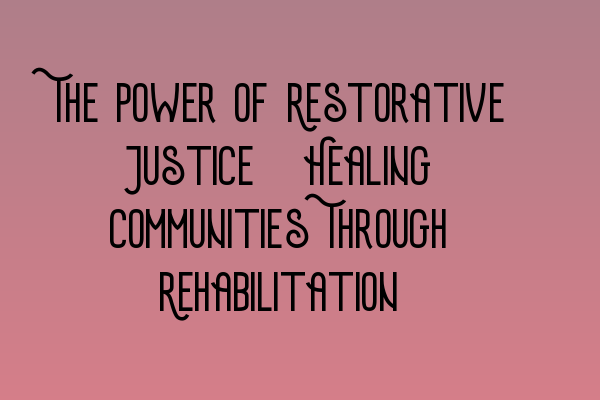The Power of Restorative Justice: Healing Communities Through Rehabilitation
As criminal law solicitors, we are committed to seeking justice for our clients and promoting a safer society. While traditional punitive approaches have their place in the criminal justice system, there is a growing recognition of the power of restorative justice in healing communities through rehabilitation.
What is Restorative Justice?
Restorative justice is a philosophy and a process that focuses on repairing the harm caused by crime and conflict. It shifts the focus from punishment to addressing the needs of those affected by the crime – the victims, the offenders, and the communities.
Restorative justice aims to encourage accountability, empathy, and participation in the resolution of conflicts. It provides an opportunity for victims to have a voice, express their feelings, and be involved in the decision-making process. It also offers offenders a chance to take responsibility, make amends, and reintegrate into society.
The Benefits of Restorative Justice
The benefits of restorative justice are numerous and significant:
- Victim Empowerment: Restorative justice gives victims the opportunity to tell their story, be heard, and seek answers to their questions. It helps restore their sense of agency and control over their lives.
- Offender Accountability: By engaging with the victims and facing the consequences of their actions, offenders are more likely to take responsibility for their behavior and work towards making amends.
- Community Healing: Restorative justice promotes community involvement, allowing individuals and communities affected by crime to come together, share their experiences, and rebuild trust and relationships.
- Reduced Recidivism: Studies have shown that restorative justice programs are effective in reducing reoffending rates. When offenders are given an opportunity to make things right, they are more likely to change their behavior and reintegrate successfully into society.
Implementing Restorative Justice
Restorative justice can be implemented at various stages of the criminal justice process, from pre-trial to post-sentencing. It can take different forms, including victim-offender mediation, conferencing, and circles. The process is facilitated by trained professionals who ensure a safe and supportive environment for all participants.
At SQE Criminal Law & Practice Law UK, we believe in the power of restorative justice. We offer comprehensive SQE preparation courses to aspiring solicitors who want to specialize in criminal law and practice. Our courses provide in-depth knowledge and practical skills required to navigate the complexities of the criminal justice system.
If you’re interested in preparing for the SQE exams, consider enrolling in our SQE 1 Practice Exam Questions or SQE 1 Practice Mocks FLK1 FLK2. These resources will help you familiarize yourself with the exam format and test your knowledge in criminal law.
For those preparing for SQE 2, we offer comprehensive SQE 2 Preparation Courses that cover all the essential areas of criminal law and practice. Our experienced trainers will guide you through the intricacies of restorative justice and provide practical insights into its application in real-life scenarios.
Stay up to date with the latest SRA SQE Exam Dates and start your journey towards becoming a criminal law solicitor who can positively impact the lives of victims, offenders, and communities through the power of restorative justice.
Remember, true justice lies not only in punishment but also in healing and rehabilitation. Embracing restorative justice is a step towards creating a safer and more compassionate society for all.
